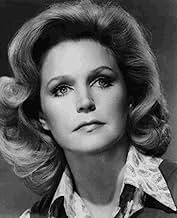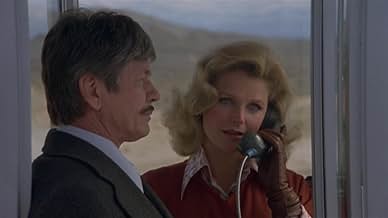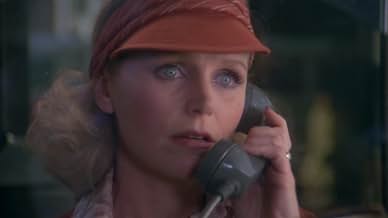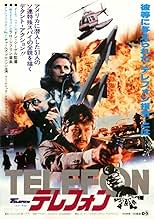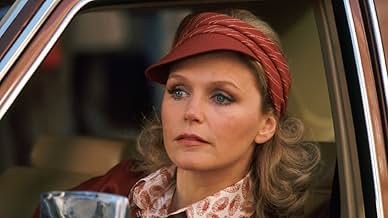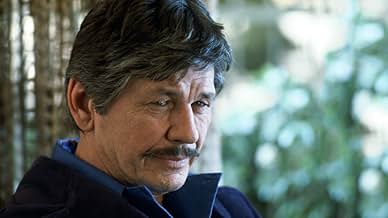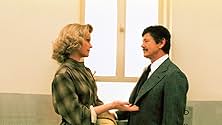VALUTAZIONE IMDb
6,5/10
6614
LA TUA VALUTAZIONE
Un ufficiale russo viene inviato negli Stati Uniti per cercare di fermare agenti dormienti che attaccheranno senza pensare obiettivi del governo quando sentiranno certe parole in codice.Un ufficiale russo viene inviato negli Stati Uniti per cercare di fermare agenti dormienti che attaccheranno senza pensare obiettivi del governo quando sentiranno certe parole in codice.Un ufficiale russo viene inviato negli Stati Uniti per cercare di fermare agenti dormienti che attaccheranno senza pensare obiettivi del governo quando sentiranno certe parole in codice.
- Regia
- Sceneggiatura
- Star
- Premi
- 1 candidatura in totale
Regis Cordic
- Doctor
- (as Regis J. Cordic)
Recensioni in evidenza
Riveting political thriller. Bronson plays a Russian intelligence major assigned to stop programmed Stalinist agents from carrying out a possible doomsday plan. Bronson's a member of a reformist wing of the Soviet Communist Party that has replaced hardline Stalinists. However, the earlier doomsday plan remains in effect, and now it's being executed in the US by a renegade Soviet agent (Pleasance). Fortunately for Bronson, the winsome Remick is assigned by Soviets to assist him. Problem is if Pleasance is not stopped he could well set off a nuclear catastrophe.
The movie has two elements from earlier Cold War films: The Manchurian Candidate (1962) and Dr. Strangelove (1964). Like Laurence Harvey in the former, agents here are programmed by trigger words to carry out their mission in robotic fashion. At the same time, there's the overhang of a possible doomsday as in Strangelove. Here those elements are skillfully blended to build suspense.
What really distinguishes the film, however, is an overall absence of Cold War good guys and bad guys. There's really only one villain, the unreformed Stalinist. Unlike 50's Cold War films, this one treats operatives of both sides strictly as professionals doing their duty without noticeable favorites. One possible exception is Remick. Despite her coy girlish manner, she's also been assigned to eliminate partner Bronson once he succeeds in killing Pleasance. That way, no one will be left to spill the beans about the aborted plan and embarrass the new Soviet regime. So Bronson is to be rewarded by his superiors with death. Maybe that's a good enough reason, but not unarguably so.
Meanwhile, Bronson's his usual steely self, while Remick plays up the girlish appearance, leaving us to guess how much of a façade it is. But stealing the show is Tyne Daly as the plain-looking brain behind the American side. Her superiors appear rather addled much of the time, while she deftly maneuvers clues behind her bank of computers. Good touch. Most of the action comes from explosions that blow up real good. I don't know how they did them in 1977, but they're impressive as heck.
Anyway, the movie suggests a possible waning of Cold War passions on our side, perhaps because of growing recognition of what a nuclear exchange would entail. Be that as it may, the movie remains a taut and under-rated political thriller, helmed by the masterful Don Siegel.
The movie has two elements from earlier Cold War films: The Manchurian Candidate (1962) and Dr. Strangelove (1964). Like Laurence Harvey in the former, agents here are programmed by trigger words to carry out their mission in robotic fashion. At the same time, there's the overhang of a possible doomsday as in Strangelove. Here those elements are skillfully blended to build suspense.
What really distinguishes the film, however, is an overall absence of Cold War good guys and bad guys. There's really only one villain, the unreformed Stalinist. Unlike 50's Cold War films, this one treats operatives of both sides strictly as professionals doing their duty without noticeable favorites. One possible exception is Remick. Despite her coy girlish manner, she's also been assigned to eliminate partner Bronson once he succeeds in killing Pleasance. That way, no one will be left to spill the beans about the aborted plan and embarrass the new Soviet regime. So Bronson is to be rewarded by his superiors with death. Maybe that's a good enough reason, but not unarguably so.
Meanwhile, Bronson's his usual steely self, while Remick plays up the girlish appearance, leaving us to guess how much of a façade it is. But stealing the show is Tyne Daly as the plain-looking brain behind the American side. Her superiors appear rather addled much of the time, while she deftly maneuvers clues behind her bank of computers. Good touch. Most of the action comes from explosions that blow up real good. I don't know how they did them in 1977, but they're impressive as heck.
Anyway, the movie suggests a possible waning of Cold War passions on our side, perhaps because of growing recognition of what a nuclear exchange would entail. Be that as it may, the movie remains a taut and under-rated political thriller, helmed by the masterful Don Siegel.
This isn't the most well-known movie in the world, so I really wonder if anyone realized that the Zucker/Zucker/Abrams team that made the original "Naked Gun" copied the whole idea of everyday people activated as assassins with bizarre catchphrases directly from this movie (remember the scene in which Ricardo Monalban "activates" his sweet elderly secretary, played coincidentally by the Zuckers' own mother, to go on a shooting rampage). I have no doubt about it: I went to the U.S. premier of "Naked Gun 33 1/3" in Milwaukee (the hometown of myself and the filmmakers) at which David Zucker said that for each of their movies, they would copy plot lines directly from serious, sometimes obscure genre films like this. I thought of this movie immediately when I saw "Naked Gun" for the first time. When you think about it, the central idea of everyday people becoming murderous robots just by hearing a stanza from Robert Frost is pretty funny by itself, and the Zuckers milked all the absurdity they could from it.
I have rather fond memories of watching this film when it was broadcast at odd hours on a local independent television station. The ideas this movie adapted from Walter Wager's original novel were quite creative, but I recall the acting of everyone here to be pretty bad (especially leads Bronson and Remick). The old-fashioned '70s computers, rotary phones, and Cold War ultra-seriousness further diminish its effectiveness. This isn't the kind of movie MGM is probably anxious to reissue on a deluxe DVD - probably because its two stars and director are all deceased, but it is a reasonably entertaining film to catch on television.
I have rather fond memories of watching this film when it was broadcast at odd hours on a local independent television station. The ideas this movie adapted from Walter Wager's original novel were quite creative, but I recall the acting of everyone here to be pretty bad (especially leads Bronson and Remick). The old-fashioned '70s computers, rotary phones, and Cold War ultra-seriousness further diminish its effectiveness. This isn't the kind of movie MGM is probably anxious to reissue on a deluxe DVD - probably because its two stars and director are all deceased, but it is a reasonably entertaining film to catch on television.
I've always liked this movie. But watching it now it is difficult not to laugh out loud at the ridiculous scenes featuring Tyne Daley and her "supercomputer." This stuff was out of date when the film came out, relying on "Lost in Space" style simplicity.
But that's forgivable. What really kept the flick from really being a classic, however, is that it is totally missing the third act! The film ends abruptly with the villain, Dalchimsky, done away with in a fairly simple manner in the small town bar. In the novel, Dalchimsky is also killed in the bar, but not before passing along the coded message that set off the last "sleeper" who then proceeds to make his way to blow up Hoover Dam (or some big damcan't remember off the top of my head). Then Bronson and Remick's characters had to race to stop the impending disaster. It was a big, exciting ending and I can't understand why they left it out. Maybe they just didn't have the budget. I think spending the dough it would have taken to include the book's ending would have helped mitigate the low budget "TV Movie" feeling "Telefon" often suffers from. But producers knew that Bronson's name would consistently pull a certain audience no matter what, so they rarely tried to do anything big in his films and he never insisted on ita fact that eventually led to the decline of his career.
But that's forgivable. What really kept the flick from really being a classic, however, is that it is totally missing the third act! The film ends abruptly with the villain, Dalchimsky, done away with in a fairly simple manner in the small town bar. In the novel, Dalchimsky is also killed in the bar, but not before passing along the coded message that set off the last "sleeper" who then proceeds to make his way to blow up Hoover Dam (or some big damcan't remember off the top of my head). Then Bronson and Remick's characters had to race to stop the impending disaster. It was a big, exciting ending and I can't understand why they left it out. Maybe they just didn't have the budget. I think spending the dough it would have taken to include the book's ending would have helped mitigate the low budget "TV Movie" feeling "Telefon" often suffers from. But producers knew that Bronson's name would consistently pull a certain audience no matter what, so they rarely tried to do anything big in his films and he never insisted on ita fact that eventually led to the decline of his career.
This time around, Bronson is a Russian major sent to the USA to eliminate a renegade Stalinist who is activating human time bombs. It's a kind of Manchurian Candidate times twelve. Bronson's double-agent assistant is Lee Remick.
The plot, though not hard to follow, is a bit intricate and involves the solution of several puzzles and a good deal of travel around the country, from Denver to Akron to Los Angeles to Cambridge (NM), to some dumpy bar in rural Texas with a rattlesnake in a cage. The series is designed to spell out the name of the villain, Dalchimsky, across a map of the USA. It's not worth going into enough detail to explain exactly what that means. But I must add that I thought it was pretty rotten of the director to actually blow that rattlesnake's head off for real, Crotalus atrox, a beautiful specimen. Where is PETA when you need them? And what do they have against snakes? Oh, sure, nobody would argue that rattlesnakes are as cuddly as French poodles or sea otters -- but, still.
Bronson is his usual self with his built-in swagger and mustache. He's a Russian major and his hair looks styled by Mister Kenneth or something. And he's completely incapable of projecting anxiety, let alone fear. Lee Remick was no longer a teenage baton twirler but she has the strangest, most appealing pair of pale blue eyes, surrounded by black circles, like Meg Ryan's. And she too has a curious rolling gait, like a sailor's. Neither Bronson nor Remich was ever a major star by Hollywood standards but they're both engaging and it's sad to think that they are now both history. I could never get with Donald Pleasance as an actor. He's probably a fine man and loves his dog, but his shining dome and pop eyes become banal in a hurry. Sheree North in her small part gives a good impression of being an exuberantly sexy no-nonsense woman.
The plot has its implausibilities. We kind of expect Bronson and Remick to wind up together somehow, and they do, but it comes out of nowhere. Bronson has heretofore done no more than smile at Remick, and that only once, when suddenly they get in the car and take off for a motel ten miles away.
A couple of fireballs for the young at mind, but no car chases, no slow motion deaths (except for that disenfranchised rattler), and only one shooting.
This is one of about two Bronson vehicles I look forward to seeing again. I'm not sure why. Schifrin's music is no more than adequate. The photography is interesting, all of its colors drawn from the red end of the spectrum, all beige, gray, orange, and scarlet. Anyone in blue looks like a tramp at a Kandinsky exhibit. Maybe I like the irony of a Russian major trying to save the USA from being blown up.
The plot, though not hard to follow, is a bit intricate and involves the solution of several puzzles and a good deal of travel around the country, from Denver to Akron to Los Angeles to Cambridge (NM), to some dumpy bar in rural Texas with a rattlesnake in a cage. The series is designed to spell out the name of the villain, Dalchimsky, across a map of the USA. It's not worth going into enough detail to explain exactly what that means. But I must add that I thought it was pretty rotten of the director to actually blow that rattlesnake's head off for real, Crotalus atrox, a beautiful specimen. Where is PETA when you need them? And what do they have against snakes? Oh, sure, nobody would argue that rattlesnakes are as cuddly as French poodles or sea otters -- but, still.
Bronson is his usual self with his built-in swagger and mustache. He's a Russian major and his hair looks styled by Mister Kenneth or something. And he's completely incapable of projecting anxiety, let alone fear. Lee Remick was no longer a teenage baton twirler but she has the strangest, most appealing pair of pale blue eyes, surrounded by black circles, like Meg Ryan's. And she too has a curious rolling gait, like a sailor's. Neither Bronson nor Remich was ever a major star by Hollywood standards but they're both engaging and it's sad to think that they are now both history. I could never get with Donald Pleasance as an actor. He's probably a fine man and loves his dog, but his shining dome and pop eyes become banal in a hurry. Sheree North in her small part gives a good impression of being an exuberantly sexy no-nonsense woman.
The plot has its implausibilities. We kind of expect Bronson and Remick to wind up together somehow, and they do, but it comes out of nowhere. Bronson has heretofore done no more than smile at Remick, and that only once, when suddenly they get in the car and take off for a motel ten miles away.
A couple of fireballs for the young at mind, but no car chases, no slow motion deaths (except for that disenfranchised rattler), and only one shooting.
This is one of about two Bronson vehicles I look forward to seeing again. I'm not sure why. Schifrin's music is no more than adequate. The photography is interesting, all of its colors drawn from the red end of the spectrum, all beige, gray, orange, and scarlet. Anyone in blue looks like a tramp at a Kandinsky exhibit. Maybe I like the irony of a Russian major trying to save the USA from being blown up.
I was never a big Charles Bronson fan. His movies usually followed the same predictable patterns of revenge and violence with Bronson usually coming off dry and stiff. His performances were usually always one note.
Of the few films of his I have enjoyed (see also "The Mechanic" and "Hard Times") from that era, "Telefon is a surprisingly gripping thriller even though the story is downright silly at times. Bronson plays (and doesn't even begin to resemble) a KGB agent out to track a killer who have been brainwashed. One call from this guy and the reciting of some lines from a Frost poem and that person is hypnotized into going out and committing an act of violence that resembles terrorism in many cases. Donald Pleasance convincingly plays the bad guy and that, I think, is what makes the movie work. Pleasance is credible in the role, thus we fear him and route for Bronson to catch him. Also on hand is Lee Remick as an American agent assigned to help Bronson but who also has a hidden agenda of her own.
Director Don Seigel handles the silly material in a straightforward manner never taking things too seriously. Bronson is less stiff then usual and the action scenes are well done. The ending is a bit abrupt but that is minor nit picking. It's a silly thriller I enjoyed and, if you are a Bronson fan, I am sure you will enjoy it too.
Of the few films of his I have enjoyed (see also "The Mechanic" and "Hard Times") from that era, "Telefon is a surprisingly gripping thriller even though the story is downright silly at times. Bronson plays (and doesn't even begin to resemble) a KGB agent out to track a killer who have been brainwashed. One call from this guy and the reciting of some lines from a Frost poem and that person is hypnotized into going out and committing an act of violence that resembles terrorism in many cases. Donald Pleasance convincingly plays the bad guy and that, I think, is what makes the movie work. Pleasance is credible in the role, thus we fear him and route for Bronson to catch him. Also on hand is Lee Remick as an American agent assigned to help Bronson but who also has a hidden agenda of her own.
Director Don Seigel handles the silly material in a straightforward manner never taking things too seriously. Bronson is less stiff then usual and the action scenes are well done. The ending is a bit abrupt but that is minor nit picking. It's a silly thriller I enjoyed and, if you are a Bronson fan, I am sure you will enjoy it too.
Lo sapevi?
- QuizDirector Don Siegel asked Charles Bronson to shave his trademark mustache off for this movie. Bronson replied, "No mustache, no Bronson." Siegel said in his book 'A Siegel Film: An Autobiography', "I felt that as much as Bronson wore a heavy mustache in Russia, it would help his disguise if he had no mustache when he arrives in Canada. However he didn't want to shave it off."
- BlooperAll of the KGB characters shown in uniform at the beginning of the film are "out of uniform." Although Borzov, Bronson's character, and the others are clearly meant to be in the KGB, the uniforms they wear are trimmed in red, the color of the regular Soviet Army, not the KGB. During the era of the film KGB uniforms were trimmed in Royal Blue. Also, the uniforms in the film lack the distinctive "Sword and Shield" patch worn by KGB officers on their jacket and coat sleeves.
- Citazioni
Nicolai Dalchimsky: The woods are lovely, dark, and deep, but I have promises to keep. And miles to go before I sleep, and miles to go before I sleep. Remember. Miles to go before I sleep.
- ConnessioniFeatured in 42nd Street Forever, Volume 3: Exploitation Explosion (2008)
- Colonne sonoreThe Yellow Rose of Texas
(uncredited)
Traditional American folk melody
I più visti
Accedi per valutare e creare un elenco di titoli salvati per ottenere consigli personalizzati
- How long is Telefon?Powered by Alexa
Dettagli
- Data di uscita
- Paese di origine
- Lingua
- Celebre anche come
- Telèfon
- Luoghi delle riprese
- Helsinki, Finlandia(Moscow, Leningrad, Russia, ten days)
- Azienda produttrice
- Vedi altri crediti dell’azienda su IMDbPro
Botteghino
- Budget
- 7.000.000 USD (previsto)
- Tempo di esecuzione1 ora 42 minuti
- Mix di suoni
- Proporzioni
- 1.85 : 1
Contribuisci a questa pagina
Suggerisci una modifica o aggiungi i contenuti mancanti



